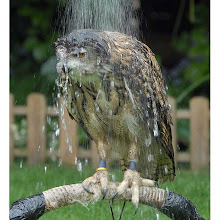Thursday, August 25, 2011
Be Like the Water
Friday, August 5, 2011
Timpanimation
A good scout notices everything. A great one also notices the absences, but even a novice would have quickly realized that a forest at night should never, ever be silent. The steady decrease in the chirrups, buzzes, rustles, and croaks took up a lot of the scout's attention and was part of the reason why the simultaneous rise of the staccato beat was nigh-imperceptible. For a while, the sound didn't register as a physical noise, but a mere unease on the edge of his perception. It tickled his thoughts, put such a subtle pall over them that it was unrecognizable until it was too late. He was within earshot of a hand drum, he froze.
The pace was measured, determined, powerful. The tempo seemed to change at random. It was unsettling. It was disorienting. It was distracting, and that angered the scout. A watcher could not lose focus, a hunter could not narrow his view, failure was death. His self-rebuke was harsh and swift when he realized that he had passed the first check point and there had been no sign of a man at his post.
He continued on, the tattoo coming from almost directly in front of him, the unnatural silence of the forest dwellers slowing his otherwise-sure footing. The first body did not surprise him, gaping slit under his jaw indicating an ignorance of the propinquity of his assassin. The second did not either, although he logged away the fact that the fallen had been slain with his own sword. The third and fourth were entangled, the former's teeth sunk firmly into the neck of the latter, whose knife was in the former's gut. The damage to the surrounding brush was extensive. The struggle must have been immense and silent to have not alerted the far perimeter guards. The drum echoed on, louder and louder, encroaching on his mind, impeding his ability to recall the names of the deceased.
Face pock-marked with shaving scars, a fiancee back home, swallowed his food half-chewed. What did we call him?
The first umbras on the trees told the scout the exact position of the main camp, the very edge of the firelight just before him. The bodies were thicker off to his left a ways, the pattern of their falls telling a tale of panicked, frightful exodus, dragged down or shot down as they fled. The growing light revealed carnage in equal measure, the increased clarity tormenting the scout with ever grislier tableaux of mauled comrades.
Edges and fringes twitched, shadows danced across the corpses, branches seemed to reach for him as the trees thinned out in proximity to the clearing. Occasionally, much of the light would be eclipsed, a lone figure interposing itself between the scout and the fire. It moved around the fire, it's undulations indistinguishable from the shadows caused by the flames themselves, its form at times nebulous for the haze and the noise and the light and the dark and the drums, oh, the drums!
The figure struck at the drum slung from its neck. The beat was inside the scout's head, his mind forced think in step with the spasmodic rhythm. Feathers and bones swished and clacked. The body of the dancer seemed to have as little structure as the roll of his vile instrument. His feet were those of a drunkard, his footing somehow remaining sure as his dance took him over dozens of corpses and corpse parts. Paint and blood dripped in parallel lines and complex designs. Were they moving? His eyes were white and spittle occasionally flew from the corners of the drummer's slack and sparsely-toothed maw.
His feelings were muddled and soporific when the first hand grasped his leg and began tugging him down toward the writhing, clutching jaws of his former friends.
